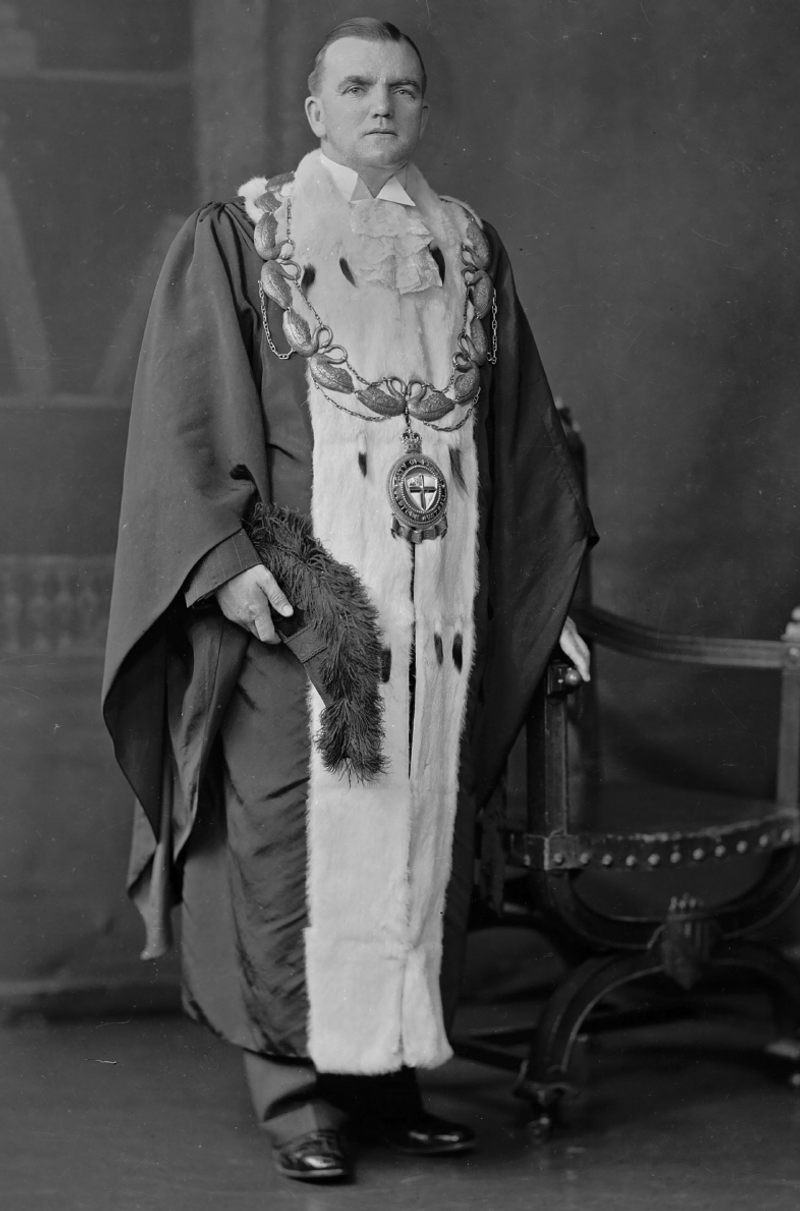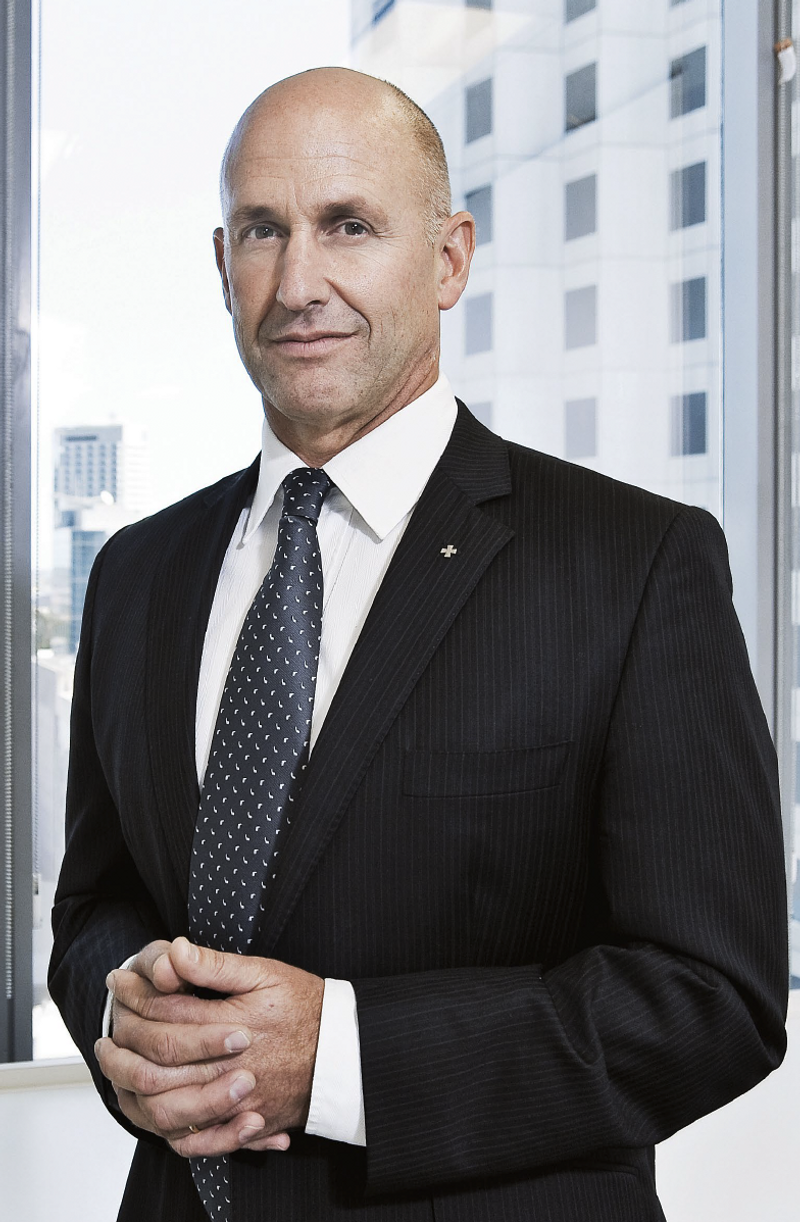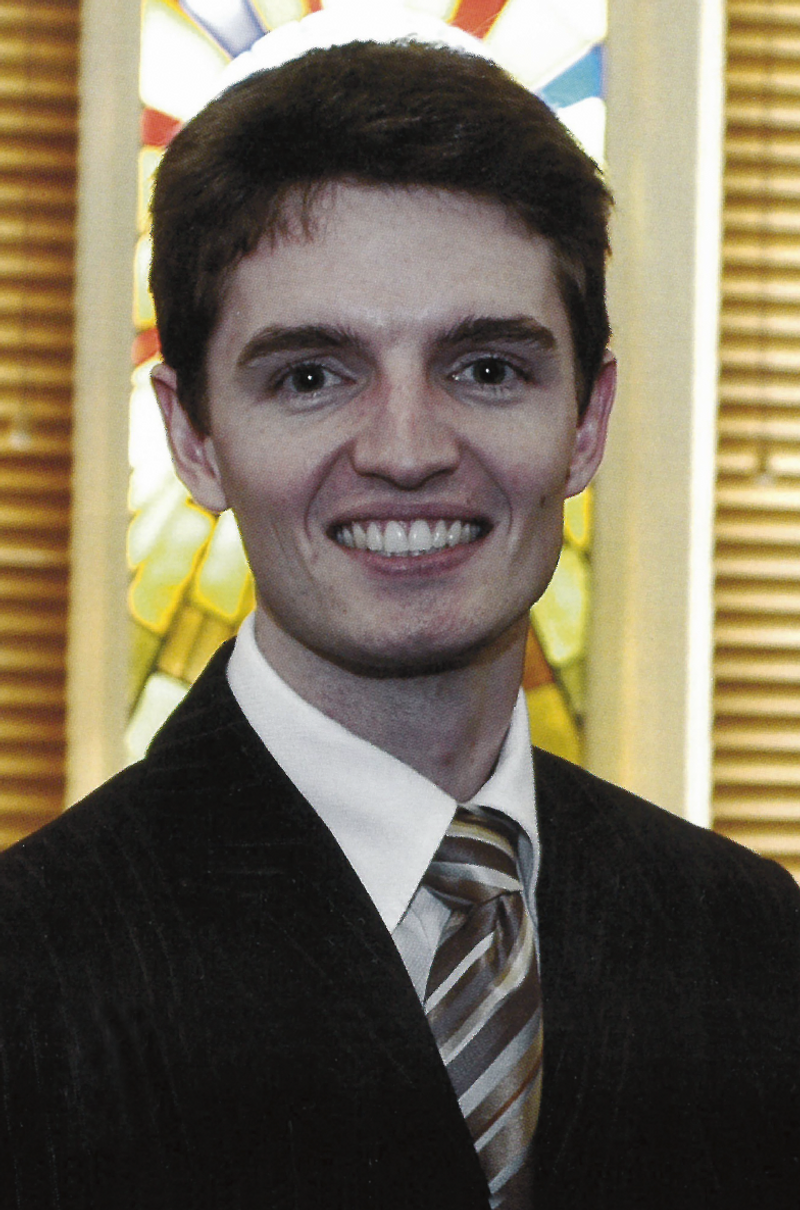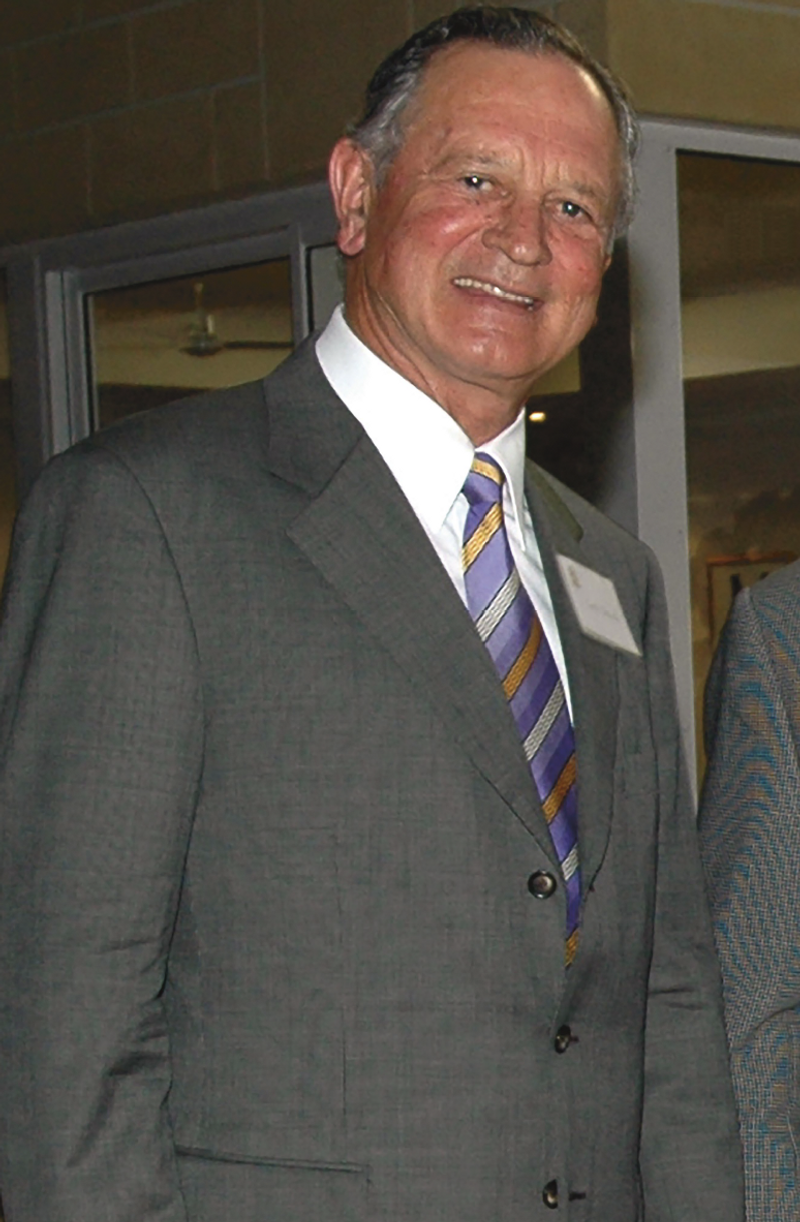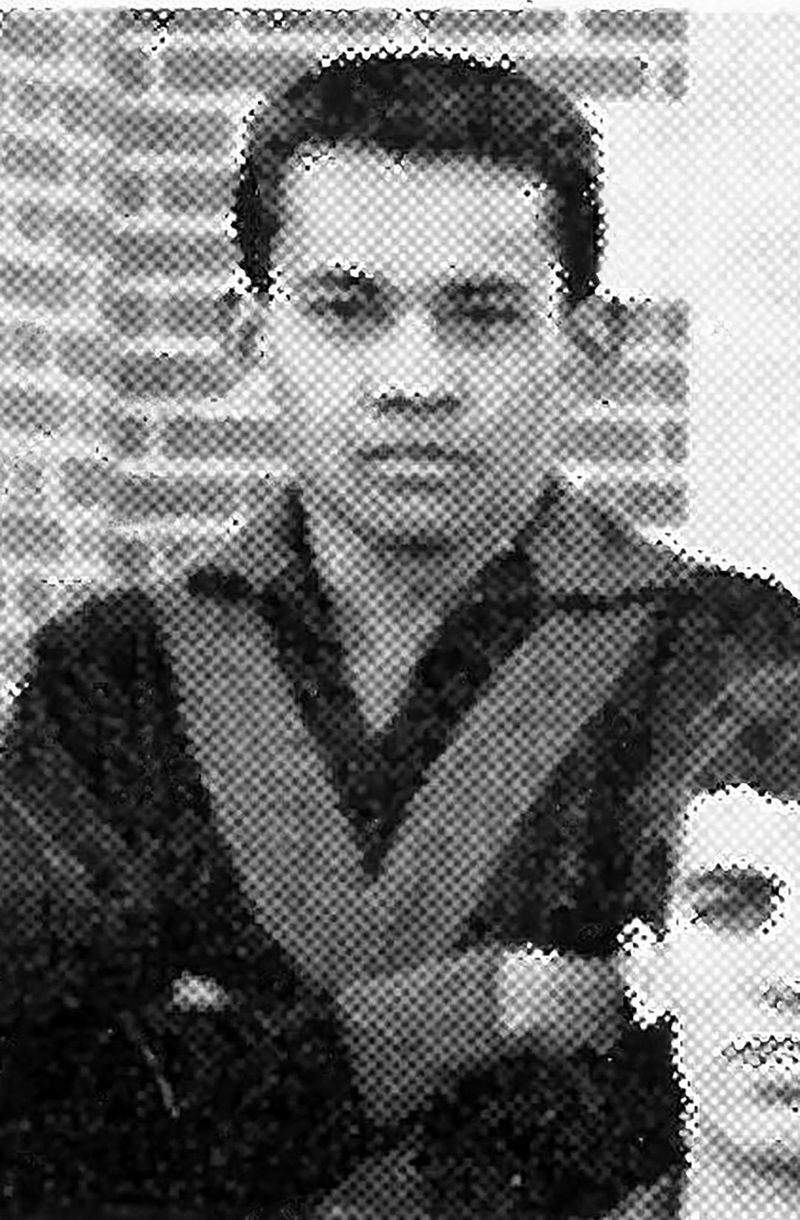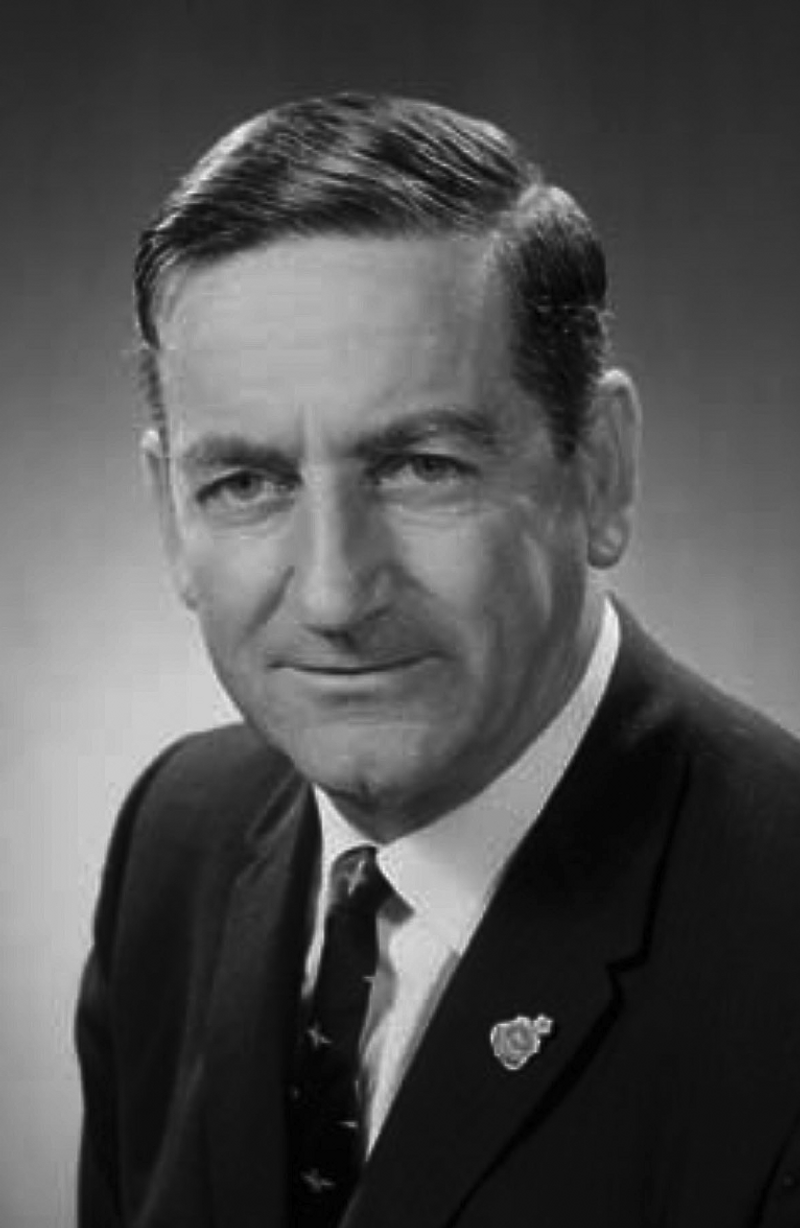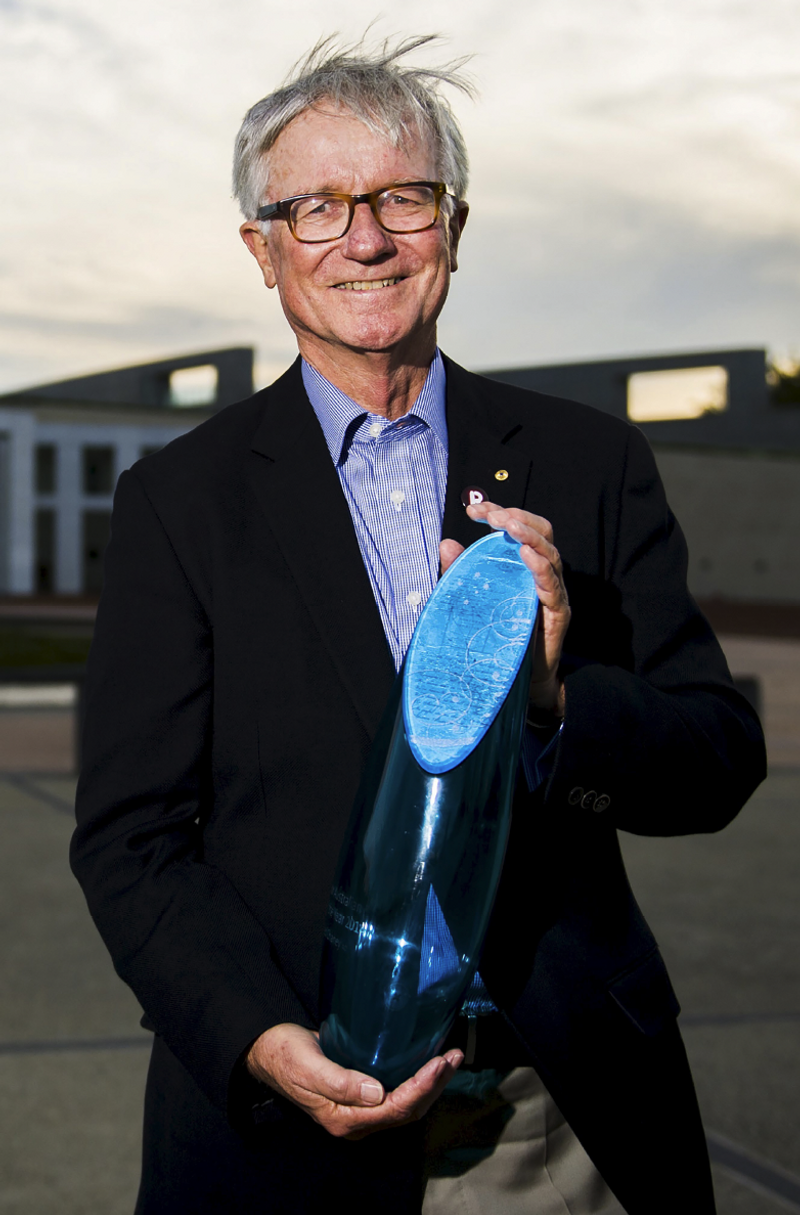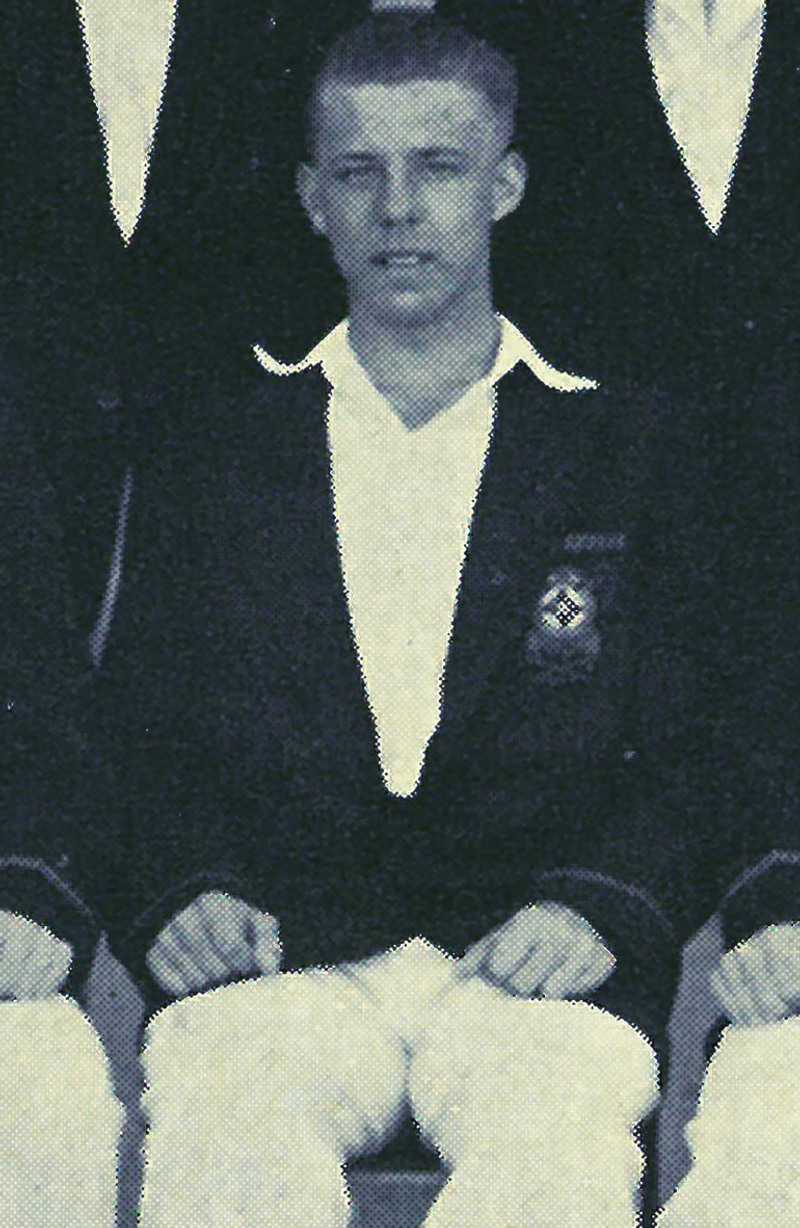Contact
Sir Thomas Meagher
Sir Thomas Meagher left his mark on so many fields of human endeavour but everything he did was underpinned by a sense of service and community, a legacy from his time spent with the Christian Brothers.
An only child of Phillip Meagher a cordial manufacturer and his wife Annie, Thomas was sent to CBC at the age of ten as a boarder in 1911 having lost his mother the previous year. On leaving Aquinas he completed the first year of Pre-med Science at the University of Western Australia before studying at Newman College, Melbourne, from where he graduated and competed in college athletics, football, swimming and rowing.
Thomas established his own medical practice in 1927 in Victoria Park after working in Perth’s children’s hospitals as a surgeon and that year married Marguerite Winifred Hough a schoolteacher and sister of his good friend John Hough. They were blessed with six children, four boys who all studied at Aquinas and two girls. One of them, Anne, was later to marry Denis Cullity, bringing two great Western Australian families together.
Thomas was a close friend of Prime Minister Curtin and was acutely aware of Perth’s wartime vulnerability. Therefore he threw his boundless energy into future-proofing WA’s war efforts and played a crucial role in raising funds. He was active in more than twenty different philanthropic war causes. In 1937 he was elected to represent Victoria Park Ward on Perth City Council and in 1939 he was appointed Lord Mayor, almost impossible at the time for a Catholic but a position he held until 1945. He was an effective and dynamic mayor and when he announced he would not stand for re-election he declared that his mayoralty had been a “war-time measure”. It was not uncommon for him to make three public appearances in an evening to make sure the job was done.
An honorary captain in the Australian Army Medical Corps Reserve, he was declared unfit for service in World War II. He was knighted in 1947. When his wife Annie died in 1952, Sir Thomas married again and kept up the pace and scope of his work for the community.
Appropriately the walk from the Junior School is lined by the jacarandas which were promulgated by him, and so take his name. His daughter remembers that he was so connected to the school and the efforts of the Christian Brothers he helped lay the planks that served as Aquinas’ first front steps. Sir Thomas shared the brothers’ view that education was a sharp tool against the prejudice Catholics suffered at the time. Both he and they sought to help boys rise through the ranks of the workforce in a time fraught with sectarianism.
Sir Thomas played a prominent role in both the Olympics and Commonwealth Games’ bodies and was a time-keeper for the Melbourne Olympics. He maintained an active profile in the community and continued to practice medicine. Additionally, he enjoyed fishing, yachting, and gardening and was vice-patron of the National Rose Society of WA. His daughter Anne stresses that the brothers and he were tireless in their pursuit of turning out men who could contribute to the country educationally socially and culturally.
James McMahon
Class of 1981
James McMahon’s passage through life was not smooth. True, he finished the year of 1981 as a Prefect, with wins in the Alcock Cup and the Slazenger Cup for AFL and Tennis respectively. He was also a Cadet Under Officer. But turbulence caused by a death in his family became the backdrop for a period of soul searching. An Old Aquinian friend helped him find work on the roads while he tried to figure out what his path would be.
In time, James found that the answer was military service. The army echoed the structure given to him by the school and he found it to be “an easy step” up. James emerged 20 years later, highly decorated, as the Commanding Officer of the elite SAS Regiment and a veteran of conflicts in East Timor, Iraq and Afghanistan. His performance in the field won him both the Distinguished Service Medal and the Distinguished Service Cross.
As SAS Squadron Commander, James’ squadron was awarded the Meritorious Unit Citation for exemplary performance in East Timor. As SAS Commanding Officer, the unit was again awarded the Meritorious Unit Citation for exemplary performance in Afghanistan. Although typically modestly, James attributes his personal awards, the Distinguished Service Medal and the Distinguished Service Cross to the men and women on the ground.
The pressures of service finally took a high toll on family life, which for James could not be more important. He particularly remembers being “picked up” from a family holiday on Rottnest and waving his family goodbye to lead a deployment with the SAS. On returning from operations in 2007, he studied and successfully completed an MBA before turning to the private sector and built up a career in financial services as probably the first person to do so having led the SAS.
Financial services proved to be a day job that was easier on the family. He served as Chief Operating Officer (COO) at Azure Capital, a corporate financial advisory firm specialising in mergers and acquisitions, for five years and then with an Azure-backed management consultancy, Chauvel Group. He also spent time with another of his passions, the West Coast Eagles (2007- 2015) to support some “leadership and cultural programs” before being recruited to their board. He later became Deputy Chair. James subsequently continued his public service with the Department of Corrective Services as the Commissioner where he introduced key performance improvements.
Always in demand and multi-talented, James is currently the COO for Australian Capital Equity. He acts as an ambassador to the Fathering Project, a Trustee on the SAS Resources Fund Board is a member of the investment committee for RSL WA and is on the boards of St John of God Healthcare and the Australian War Memorial. He was named 2018 Western Australian of the Year.
James is keen to stress that “there is no cookie-cutter life” waiting for anyone. Be positive and make your way. None of his achievements came easily. The three things he carries with him every day: “Be the best person you can be – treat yourself and others with respect; always have a go and lastly do your best.”
He learned these foundations on the fields and in the classrooms of Aquinas College.
John McAnearney
Class of 2003
John’s outstanding success at Aquinas College was fuelled by a combination of ability and determination. He says: “Nothing came easy”, but you would not think it for the Dux of 2003. John was fascinated by the opportunities robotic engineering provided. He could see a big gap in our understanding of the interface between biological science and engineering. Coming from a rich heritage of engineers, John wanted to use his time well at Aquinas and stretched himself to excel in Economics, English Literature, Physics, Chemistry, Calculus and Applied Mathematics. He attributes much of this to: “taking things apart from an early age”. At school, he immersed himself in everything Aquinas offered: playing in the Cricket XIs, Hockey XIs, a regular member of the drama production cast and playing in the College’s Santinas band. He also won the Headmaster’s Prize for Leadership.
Never happy with one of anything, John successfully completed two degrees at UWA: Bachelor of Electrical Engineering and Bachelor of Science in Human Biology. Struck by the similar cultures of UWA and Aquinas College, he thrived at university. John was frustrated by the lack of overlap between engineering and neuroscience and so studied the “brain-computer interface” in his last year at UWA. His Rhodes Scholarship propelled him into a space where engineering and medicine could co-exist. At Oxford, he graduated with an MSc in Financial Economics and Biomedical Engineering.
Along the way, he helped pioneer a device the size of a small desktop photocopier that aided early breast cancer diagnosis. He also worked on the compilation of a figure that would help diagnose a patient’s correct state of health in an ER crisis. At this stage, for him, the missing piece in the jigsaw was understanding business and how to be successful in commerce as his father had been for 35 years. So John successfully secured a place at Harvard and graduated with an MBA.
After a year as an associate at investment banking giant JP Morgan, he is now an Analyst, Special Situations at global investment and technology firm D.E. Shaw in New York. Here he finds his financial qualifications combined with his understanding of biology and how technology is helping engineering to improve lives all meet at a perfect junction.
The journey is only just beginning for this hugely talented young man. He says of his time at Aquinas College: “it was welcoming and warm and positive in spirit. That meant turning up to study was a joy! The longer I am away, I realise that what we had during high school was very special, and being away has heightened that feeling of good fortune”.
What got him to where he is today? He simply asked the question of himself every day: “How I can be the best person for those around me and how I can be the best for myself?”
Geoff Churack AM
Class of 1955
The Churack Pavilion, on the boundary of Memorial Oval, is not only an outstanding sports and viewing facility, but also caters for the many needs of students, Old Boys’ communities and guests of the College. The principal donor and fundraiser for its construction was Geoff Churack (one of three Churack boys 1946-55) who says the much-needed building was a great opportunity to express his thanks and appreciation to the Christian Brothers, the College and his parents for their contribution to his education and values.
Geoff came to Aquinas from the North Dandalup Primary School (where his Dad was the headmaster). Geoff made a major contribution to the College over the next four years. He captained 1st XI Cricket, was vice-captain of 1st XVIII Football, and a member of the Athletics, Swimming and Shooting teams. He was Under Officer in Cadets and a College Prefect.
On leaving school Geoff worked for GM Holden in Mosman Park and studied accountancy, business and sales management, and people skills. He also learnt how to manage and own car dealerships in a growing West Australian population. Since 1965, he has had active interests in Holden, BMW and Toyota dealerships. He still gets his greatest pleasure from seeing good young people grow and succeed. The Australia Day Awards recognise the achievements of a diverse group of West Australians who have excelled in their fields to enrich the communities in which they live. In 2018, Geoff was made a Member (AM) for his philanthropic support of medical research and education at both Notre Dame and Murdoch universities as well as his service to the retail automotive industry and many sporting groups.
Geoff’s commitment to cricket and cricket people is also evident through the many WACA committees and his Life Membership of the Incogniti Cricket Club (England and WA). He remains an ongoing benefactor of Aquinas College and the University ofNotre Dame.
Jimmy Chi
Class of 1965
Jimmy Chi was born to a Japanese/Chinese father and a Scottish/Aboriginal mother from the Bardi tribe. Although brought up in Broome, he was sent by a group of Irish nuns and German priests to a Catholic college in Perth in Rossmoyne. Then he was selected to attend Aquinas College.
He was a bright student and did well academically and on the field. Jimmy left with the second position prize for Religious Education and played in the 1st XVIII in his final year. He went to university the following year but did not finish his degree.
Tragically Jimmy was badly injured in a car accident in his early 20s and spent three weeks in hospital. Although he recovered physically, all who knew him to say he was never the same again and Jimmy was diagnosed with schizophrenia in 1970 at the age of 22. He felt that he had let people down by not finishing his degree and he struggled to find the resilience needed to get back up and fight the good fight. It was a struggle that would stay with him his whole life. Music provided him with a path back to normal life and Jimmy wrote songs with several friends.
He formed the group "Kuckles" in Adelaide while studying at the Centre for Aboriginal Studies in Music (CASM). An audition tape titled "Millya Rumarra" won him the opportunity to perform in Germany. This became the basis for his most famous contribution to Aboriginal culture: Bran Nue Day. In 1991, it earned Jimmy the Human Rights and Equal Opportunity Commission Drama Award. The stage production toured Australia winning awards and the movie was released in 2009. It was greeted with mixed reviews but helped cement the careers of a number of now well-known indigenous actors. But the significance of this work and others of Jimmy Chigoes far beyond the critic’s pen. He forced the issue of indigenous identity into the limelight.
Jimmy faced his own demons bravely and his contribution to Australian artistic endeavour is the greater because of them. In 1997, Jimmy received the Red Ochre Award for his contribution to the indigenous arts and was also made the patron of SANE Australia. In 2004, Jimmy Chi was honoured by the Western Australia as a Living Treasure.
Hon. Justice John Chaney
Class of 1970
John is the youngest of the Chaney dynasty, and one of the most hard-working which is impressive in the context of the family’s formidable work ethic. John, in spite of having climbed to the top of his profession, has that lack of ego typical of a great Aquinian. Like his brothers, he did well in the classroom and on the sports field. He captained the First Eighteen, the Athletics Team and the Second Eleven in cricket. A “heady point winner” of the debating team, hewas also a CUO in the cadets. He left in 1970 as Captain of the School and made the farewell speech at the end of the year Speech Night. He says being a boarder in his last year helped him when his father Sir Frederick Charles Chaney moved to Darwin as Minister for the Northern Territory.
After graduating in Law from UWA in 1976, John became a partner at Northmore Hale Davy and Leake, later Minter Ellison and Co in 1980 and stayed fourteen years before joining the Independent Bar in 1994. He specialised in commercial litigation, planning and administrative law, and medical negligence. In 2004, John was appointed as judge in the District Court, and shortly afterwards became one of two inaugural deputy presidents of the State Administrative Tribunal (SAT) in 2005, a new jurisdiction which saw the streamlining of 80 different decision-makers into one overarching Tribunal. This new jurisdiction covered a wide range of issues: planning cases, from single houses to massive commercial developments; professional and vocational regulation and disciplinary proceedings; building and strata titles disputes; and guardianship cases where the tribunal took the responsibility of protecting vulnerable people. This period of his career cemented John’s reputation as one of the leading lights of the legal profession in West Australia.
Continuing to climb he became President, SAT and a justice of the Supreme Court in 2009. Throughout his career, his love of cricket stayed with him and he toured internationally with a team of legal eagles known as “The Stragglers” playing with fellow devotees across the world.
He has, over the years, sat on boards of not for profits such as the College of Optometrists, based in Melbourne and currently serves as Chair of the Piddingdon Society which fosters collegiality and mentoring amongst young lawyers. He was also President of the Law Society in 1991 and sat on its Council for ten years. After fourteen years as a judge, he retired and now practices as a mediator and arbitrator at Francis Burt Chambers.
Few in the legal profession of West Australia have John’s keen eye for detail or his ability to unpick complex cases. John remembers back to his farewell speech at Aquinas College where after encouraging the next generation of students to make the most of their time he finished by saying: “So do your best and I hope for your sakes that when your time comes, it’ll be as difficult for you as it is for me to say “Goodbye Aquinas”.
Sir Fred Chaney Sr KBE, AFC
Class of 1932
Social justice is a theme that runs strongly through the Chaney family, its roots with Fred Chaney Sr, the first of seven Chaneys to attend the school. His mother was widowed during his school years and he saw out the Depression as the son of a single mother. It left a mark and no doubt motivated him to secure a scholarship at Aquinas. He was an active member of the Debating team and continually shone on the athletics field: regularly winning the 100 yds and 220 yds, gaining a place in the “quarter-mile” and the hurdles. He was Champion Athlete in 1931 and won the 100 yds and 220yds at Interschool Athletics. He was in the winning Alcock Shield team in his leaving year, 1932.
Economic necessity dictated that he train as a teacher rather than pursue his chosen path of engineering. Fred appointed initially as monitor, and with no official training nevertheless, taught in state schools for nearly a decade. He met and married Mavis in 1938 and together they raised six children: Fred (Jr), Robin, Karen, Richard, Michael and John.
Fred enlisted in the RAAF, trained as a pilot and qualified as a flying instructor before serving in Papua New Guinea and Borneo. The courage and skill he displayed in hazardous operations in Borneo won him the Air Force Cross.
He returned to teaching for five years before resigning, as acting headmaster, to pursue politics. Fred held the federal seat of Perth for the Liberal Government from 1955 to 1969 and served in the cabinet for many years. Robert Menzies appointed him as Minister for the Navy in 1963. In 1970 he was appointed the Administrator of the Northern Territory and he established himself as a strong advocate of Aboriginal land rights. Both he and Lady Chaney were made blood brothers of Groote Eylandt Aboriginal artist Yirawala in recognition of his achievements. He was Lord Mayor of Perth from 1978 to 1982 and twice decorated by the Queen: once in 1970 with a CBE and again in 1981 with a KBE. Additionally, Sir Fred Chaney was state president of the Returned Services League.
Fred’s long history of public service is rooted in his fierce commitment to social justice and a belief in the inherent equality of people. The drive that sustained his impressive list of achievements came from values instilled during Catholic schooling in Perth. This and the strength of his marriage to Mavis were the two aspects of his life he has successfully imparted to his children.
Fred Chaney Jnr AO
Class of 1957
The second Fred Chaney to grace the playing fields of Aquinas was truly a chip off the old block. He left Aquinas College as prefect, third in his year overall, captain of the Debating team and winner of the Oratory Prize. He graduated from university in Law and was admitted as a barrister and solicitor in WA in 1963. He practised in Papua New Guinea but knew ultimately he would follow in his father’s footsteps and join the cutthroat world of politics. So it was, he was elected in the 1971 by-election of Ascot running for a seat in the State Legislative Assembly. He was elected to federal parliament as a Liberal Senator in 1974 and became leader of the Opposition in the Senate from 1983 to 1990 when he became the first member for the division of Pearce in the House of Representatives. He was named deputy leader of the Liberal Party in May 1989 and retained this post until April 1990, two months after transferring to the Lower House.
Like his father, he was a man of integrity who could see that the needs of the country should take precedence over the needs of the party and, therefore, left it in 1995 believing that he needed to work cross-party to get things done. His hard work in support of marginalised people has never faltered and indeed runs like a rich seam through the Chaney family.
He was a founding co-chair of Reconciliation Australia and an early advocate of aboriginal voting rights. Fred established the Aboriginal Legal Service of Western Australia and he sat as Federal Minister for Aboriginal Affairs (1978-80). He was Deputy President of the National Native Title Tribunal and more recently Chair of Desert Knowledge Australia. Fred also played a key role in setting up the Graham Farmer Foundation which supports indigenous young people to reach their potential.
Fred, not surprisingly, received an Officer of the Order of Australia in 1997 for service to the Parliament of Australia and to the aboriginal community. Prime Minister Tony Abbott also declared him Senior Australian of the Year in 2014 and he was awarded the Centenary Medal for service to parliament and education in 2001.
Brian Aubrey Burt
Class of 1955
Born the son of Aubrey, a journalist and former WA middleweight boxing champion and Irene, nee Dobson, Brian came to Aquinas when his family moved to Perth in 1946. He won a state bursary to study dentistry at the University of WA. During his university days, Brian’s pride in Aquinas was very evident to all who saw him driving around in his ute which was painted in the trademark red
and black stripes. On graduating, Brian practised in Mt Magnet 600kms north-east of Perth. He met Lizzie Meehan from Geraldton who remembers the occasion very clearly: “a hot dusty drive in the mobile dental van, it was an offer to make him a cup of tea that won his heart”. After marrying in 1965, they set off on the Oriana from Fremantle bound for the US, which was the beginning of a huge adventure. Brian completed a master’s program in dental public health at the University of Michigan in Ann Arbor and went on to study at the National Institute of Health in Washington DC. He and Lizzie moved to London for seven years where he worked at the London Hospital in Whitechapel, completed his doctorate and their two sons Ashley and Matthew were born.
As is frequently the case when you do a great job the first time around the University of Michigan pursued him and brought the family back as assistant professor of the School of Dental Public Health, and shortly after he became a professor. He held many senior positions in the public health arena before retiring in 2005 as Professor Emeritus.
Brian is world-famous for three editions of “Burt’s Book” which is obligatory reading for anyone pursuing dental public health. He was an expert in his field but was also known for his wholehearted mentoring of current and former students.
But this is only half his story: when diagnosed with high cholesterol and risk of heart disease he and his wife changed their diets and designed a rigorous exercise regime. Short runs around the block morphed into short road races and eventually marathons. In fact he competed in seven Boston marathons. (Best time: three hours and one minute!) They also competed in triathlons and Ironman contests in Hawaii and Perth.
Sadly, Brian lived with Parkinson’s disease since 2009. His passing on September 9, 2019, prompted a stream of testimonials from American and international friends, colleagues, and former students, many of whom he mentored through their invariably prestigious careers.
He inspired his students to achieve beyond their wildest expectations both in the classroom and on the running track. The Dean of the College of Dentistry at the University of Florida, Isabel Garcia said: “Brian leaves a tremendous legacy as an outstanding researcher, teacher, mentor and much more”.
